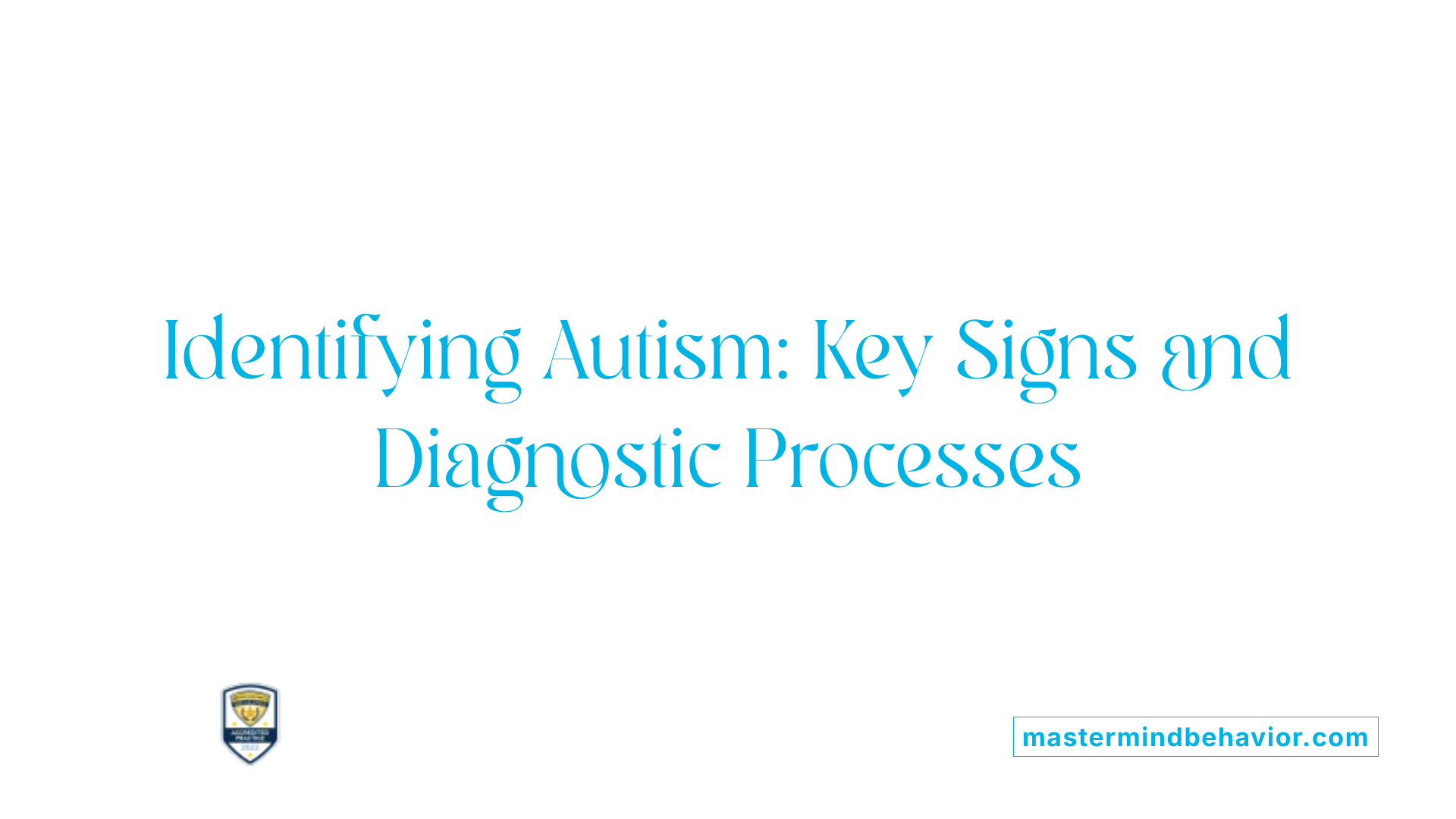Coping with hypersensory challenges with support from Autism Spectrum Therapies professionals
Coping with hypersensory challenges with support from Autism Spectrum Therapies professionals
Blog Article
Recognizing the Effect of Behavioral Autism on Daily Life and Social Communications
You may not realize exactly how deeply behavioral autism affects day-to-day live and social interactions. People on the spectrum commonly navigate a world loaded with interaction difficulties and sensory overload. These challenges can result in stress and seclusion, impacting their partnerships and general health. Understanding these nuances is essential for promoting helpful environments. What techniques can we carry out to develop even more purposeful links and comprehensive spaces? The answers may surprise you.
Defining Behavioral Autism and Its Qualities
Behavioral autism, commonly described as autism spectrum disorder (ASD), incorporates a range of conditions defined by difficulties in social interaction, communication, and repetitive behaviors. You could see that people with ASD frequently have a hard time to translate social hints, which can result in misconceptions in discussions. They might find it tough to establish eye contact or engage in small talk, making social circumstances really feel overwhelming.
Interaction problems can show up in different means, from postponed speech growth to a choice for utilizing fewer words. By acknowledging these qualities, you can promote an atmosphere that promotes approval and motivates effective interaction, helping people with autism thrive in their everyday communications.
The Range of Autism: Comprehending Irregularity in Behavior
Autism range problem (ASD) isn't a one-size-fits-all diagnosis; it differs widely among people. You could discover that some individuals with ASD display light signs and symptoms, while others might face more substantial obstacles. This irregularity can materialize in behaviors, interests, and sensory level of sensitivities. You may encounter individuals that are very spoken and involve easily in conversations, while others could prefer solitary tasks or connect non-verbally.
In addition, the way people with ASD respond to sensory input can differ substantially; some may be overwhelmed by loud noises or bright lights, whereas others grow in stimulating atmospheres. The range also includes differences in social interactions; some individuals may have a hard time to translate social hints, while others navigate social settings with family member simplicity. Comprehending this variability is crucial, as it helps you appreciate everyone's unique experience and dressmaker assistance to their details demands, cultivating an extra comprehensive atmosphere for everyone.
Interaction Obstacles Encountered by People With Autism
When you interact with individuals on the autism spectrum, you may observe their special communication challenges. They typically face problems with both nonverbal and spoken hints, which can influence their social interactions. Understanding these barriers is essential for promoting much better links and support.

Verbal Communication Difficulties
Many individuals on the autism spectrum experience spoken communication difficulties that can considerably affect their daily communications. You might discover it challenging to reveal your thoughts, feelings, or requires clearly. This can cause irritation for both you and those around you, as misunderstandings take place. You may deal with launching conversations, keeping a subject, or understanding nuances in speech. Frequently, you may choose using basic language or repeated expressions, which can limit your capacity to take part in deeper discussions. Your tone, quantity, or pace could not align with social expectations, creating others to misunderstand your objectives. Acknowledging these challenges can help you and your assistance network create strategies to enhance interaction and cultivate better connections with others in your every day life.
Nonverbal Interaction Obstacles
Spoken communication isn't the only obstacle individuals on the autism range face; nonverbal communication obstacles can be just as significant. These obstacles can lead to misconceptions or false impressions of social signs, making communications feel frustrating or complex. By resolving nonverbal interaction, you can locate approaches to enhance your social experiences and enhance your overall high quality of life.
Social Interaction Effects
Social interactions can commonly feel frustrating due to the one-of-a-kind communication challenges dealt with by people with autism. Recognizing these difficulties can help you find approaches to enhance interaction, such as exercising social abilities in safe setups or making use of aesthetic aids. Comprehending your requirements allows you to browse social communications with better self-confidence and simplicity.
Social Interaction and Connection Building in Autism
While structure partnerships can be challenging for people with autism, recognizing their special point of views and communication designs can foster meaningful links. You may notice that many people on the spectrum favor straight communication and might have problem with social cues or tiny talk. By being straightforward in your communications, you can assist create a setting where they really feel comfortable.
Make the effort to observe and listen exactly how they share themselves. This understanding can direct you in guiding discussions more properly. Participating in shared passions can also act as a bridge to deeper links. Whether it's a hobby, a preferred show, or a mutual interest, these common threads can open up doors to friendship.
Daily Life Routine: Browsing Obstacles and Techniques
Navigating every day life routines can be especially testing for individuals with autism, especially when unexpected changes occur. You may find comfort in having an organized timetable, as it helps you anticipate what's next. It's typical to feel overwhelmed or nervous when interruptions occur. To navigate these difficulties, take into consideration implementing visual schedules or checklists. These devices can give clarity and reassurance.
Establishing a routine that includes sensory breaks can also be click here useful. You can prepare short breaks throughout your day to recharge. It's necessary to communicate with those around you, letting them know your demands and preferences. This helps create an understanding setting.
Last but not least, technique mindfulness strategies to handle stress and anxiety and anxiousness. Basic breathing workouts or basing strategies can make a substantial distinction. By integrating these methods, you can boost your day-to-day regimen and reduce disturbances, making life feel a lot more workable.
Strengths and Capacities of People on the Autism Range
Comprehending daily life regimens is just one facet of the autism experience. Numerous people on the autism spectrum have amazing toughness and capabilities that set them apart. You may discover that your interest to detail is outstanding, allowing you to master tasks that need precision and focus. Your capacity to believe outside package can result in innovative remedies in different scenarios.
Moreover, your memory abilities frequently shine, particularly in locations of interest. Autism Spectrum Therapies. This knack for maintaining details can make you a valuable resource in fields like science, technology, or art. You may additionally show strong aesthetic thinking, enabling you to imagine complicated principles and address problems artistically
In addition, your distinct point of view on the world can promote empathy and understanding in others, enriching social interactions. Welcoming these toughness not just improves your self-confidence but likewise helps others appreciate the varied skills you give the table.
Creating Inclusive Atmospheres for Individuals With Autism
Creating inclusive settings for individuals with autism starts with designing sensory-friendly rooms that deal with their special needs. You can also foster opportunities for social interaction, helping to construct friendships and connections. By making these modifications, you'll add to a more welcoming ambience for every person.
Designing Sensory-Friendly Spaces
While developing sensory-friendly rooms, it's vital to show on the special demands of people with autism. Incorporate quiet zones where people can pull back and recharge when bewildered. Consist of aesthetic schedules or clear signage to help individuals browse the space confidently.
Advertising Social Communication Opportunities
Designing sensory-friendly areas not just addresses specific comfort however additionally establishes the stage for purposeful social communications among people with autism. To promote these interactions, create comprehensive atmospheres that welcome involvement. Organize structured tasks, like art classes or group games, that encourage collaboration without overwhelming sensory input. Use aesthetic help and clear interaction website to aid every person involve pleasantly. Urge peer mentoring, combining people with autism with encouraging peers that can lead them via social circumstances. Additionally, consider hosting normal area occasions that celebrate neurodiversity, fostering acceptance and understanding amongst all participants. By applying these techniques, you can boost social opportunities, assisting individuals with autism construct relationships and enhance their social skills in a secure, inviting environment.

Frequently Asked Inquiries
Exactly How Can Pals Support Somebody With Behavioral Autism?
You can sustain a good friend with behavioral autism by holding your horses, listening actively, and appreciating their borders. Take part in tasks they delight Aba Therapist in, communicate openly, and develop a comfortable atmosphere where they feel valued and recognized.
What Resources Are Available for Parents of Children With Autism?
You can check out numerous resources for parents of children with autism, including support groups, educational sites, and regional social work. Linking with other parents can likewise offer useful understandings and shared experiences to assist browse difficulties.
Can Behavioral Autism Modification Gradually?

Yes, behavioral autism can change with time. You may notice shifts in interaction, social skills, and actions as your youngster expands. Early treatment and assistance commonly play crucial functions in these developmental adjustments.
Exactly How Do Sensory Sensitivities Influence Every Day Life?
Sensory sensitivities can make day-to-day experiences frustrating. You could have problem with brilliant lights or loud noises, bring about stress and anxiety or avoidance. Finding settings that accommodate your demands can considerably improve your convenience and overall every day life.
What Prevail Misconceptions Concerning Behavioral Autism?
You may think behavior autism just impacts interaction skills, yet it's more complicated. Many think people lack empathy or knowledge, which isn't real. Recognizing these misconceptions helps foster acceptance and support for those on the spectrum.
Behavior autism, usually referred to as autism range problem (ASD), includes an array of conditions defined by obstacles in social interaction, communication, and recurring behaviors.Social communications can frequently really feel frustrating due to the special interaction challenges dealt with by people with autism.Creating sensory-friendly spaces not only addresses private convenience but also sets the stage for significant social communications among people with autism. Motivate peer mentoring, coupling individuals with autism with helpful peers that can assist them with social circumstances. By implementing these methods, you can boost social possibilities, helping people with autism develop relationships and enhance their social abilities in a secure, inviting atmosphere.
Report this page